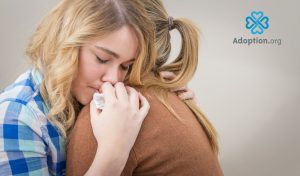Every adoptee, at one point or another, longs for more information about their birth family. Even in an open adoption, there is still information that adoptees might be missing, that might spur them to contact their birth family. For adoptees in a closed adoption who are hoping to make their first connection with their birth family, an immense amount of bravery and emotional energy is required to put yourself out there and ask for a relationship. If the adoptee comes to find, either directly or indirectly, that their biological parent or parents are not interested in having a relationship with them, it can be crushing. If you are finding yourself in this unfortunate situation, here are some things to keep in mind.
- Their non-interest in a relationship should not be construed as a rejection of who you fundamentally are as a person. Most of the time, birth parents who reject a relationship with children they placed for adoption do so because of their own issues, not because they think the child is somehow inferior or unworthy of their time. Many birth parents are unable to resolve their grief over placing and feel a relationship is not something they could emotionally manage. This does not mean that you should feel unwanted. On the contrary, their feelings regarding your placement are so strong that they can’t manage a reunion. You are not less deserving of love or attention because of this.
- Life is long. Even if you are 50 and making the first attempts to reach out to your biological parent, just because they do not wish to make contact now does not mean that this will always be the case. It is possible that in a year, or five years, or a decade, they might be ready for that relationship. Try, if you can, to keep tabs on their whereabouts and have a way of contacting them or one of their family members; social media can be very helpful with this. Even if you get a rejection now, no matter how badly it hurts, be willing and open to trying again in the future, whenever you feel ready.
- Often times, individuals who place a child for adoption are doing so because they are, in some way or another, in crisis. Had they been living a life with great stability and support, they would have been more able to parent. For some birth parents, this instability, unfortunately, can be a lifelong pattern. Mental illness, substance abuse, homelessness, and more are unfortunately common issues for birth parents. If they cannot negotiate their own life successfully, they will be more likely to be less inclined to want to pursue a relationship with you, either because they don’t have the resources to do so, or because they feel some degree of shame at how their life may have “turned out.” If you think the latter is at all a possibility, make sure to reassure them that you are just interested in a relationship with them, one on one, no strings attached. If they can tell you are nonjudgmental they may be more inclined to pursue a relationship.
- They might be ready to have a reunion with you, but other people in their life might not be. If they hid their pregnancy and placement from family, they might not want to have to tell them what really happened. Also, many birth parents, after placing, move on to have spouses and other children. They may worry that the children they are parenting would not want to know about you or have a relationship with you. They may have a spouse who is discouraging them from reuniting. They may feel their community or other relationships could be adversely affected. They might even worry about how your reunion would affect your adoptive parents.
- Lastly, even if one of your biological parents is not interested in a relationship, don’t assume the other isn’t. Or even if both parents are not interested in reuniting, don’t assume there aren’t extended family members who might be interested in connecting with you. Even a grandparent, aunt, or cousin is still a connection to your birth family and might be able to give you answers to some of your questions or possibly even serve as an intermediary between you and your biological parents.
Julianna Mendelsohn lives in sunny South Florida where, odds are, it is hot enough right now that she’s sweating just a little, no matter what she’s doing. She is the brains, brawn, blood, sweat, and tears behind The Adoption Mentor and is thrilled to be able to help others build their families through adoption. She is a former elementary school teacher, current MS in school counseling student, Sephora junkie, and the momma via domestic adoption to one lovely daughter.
